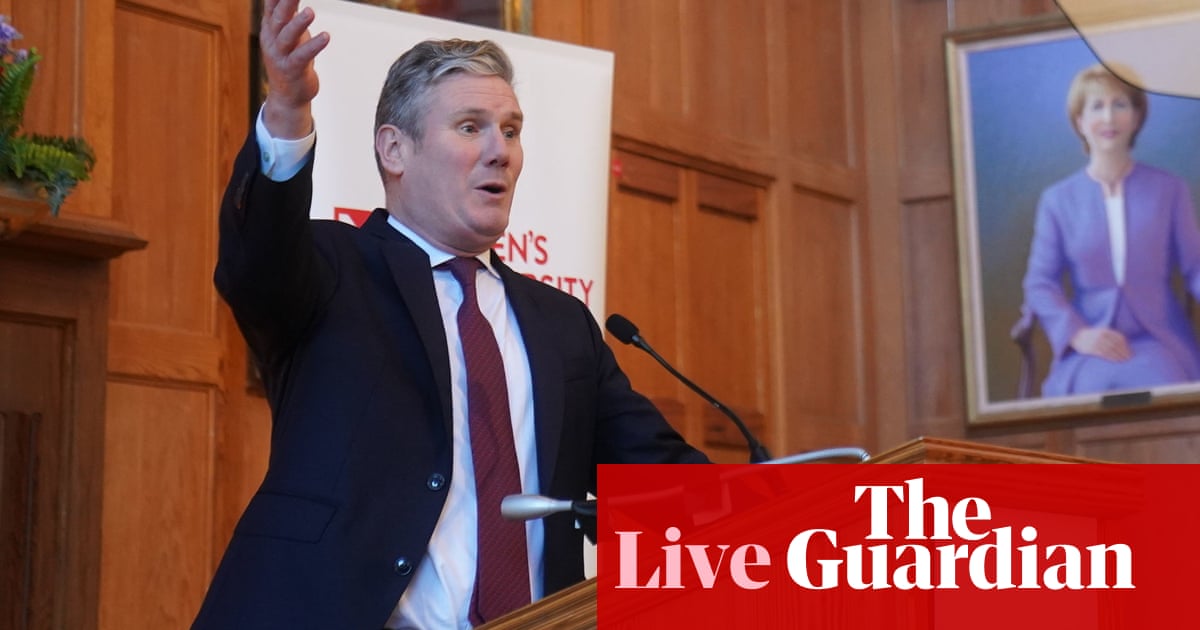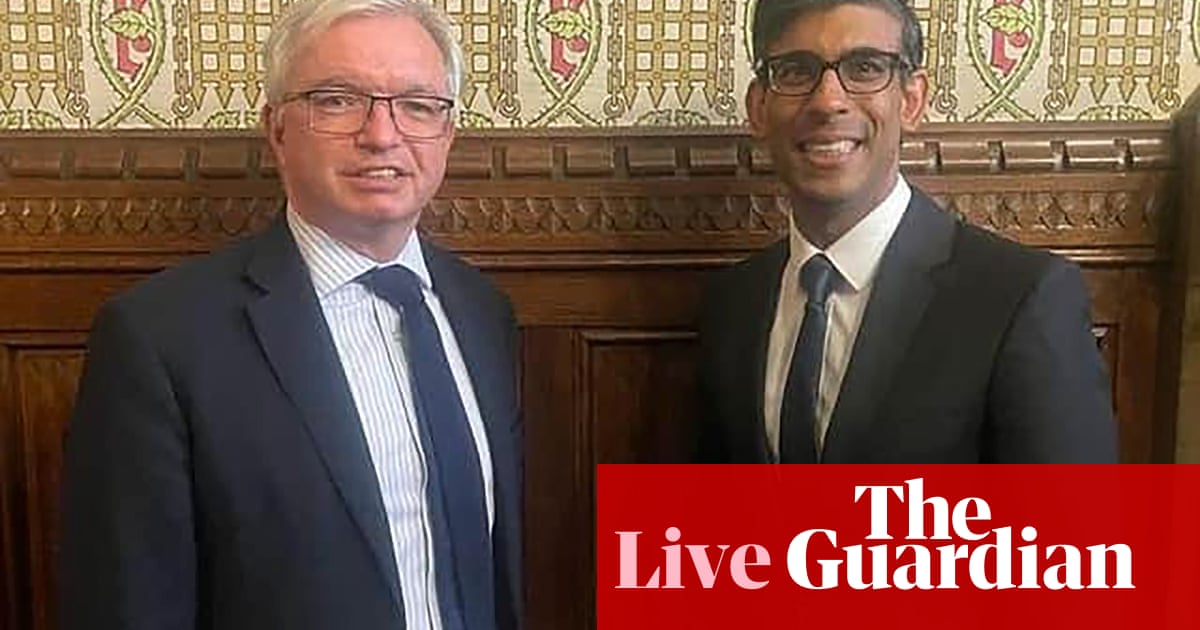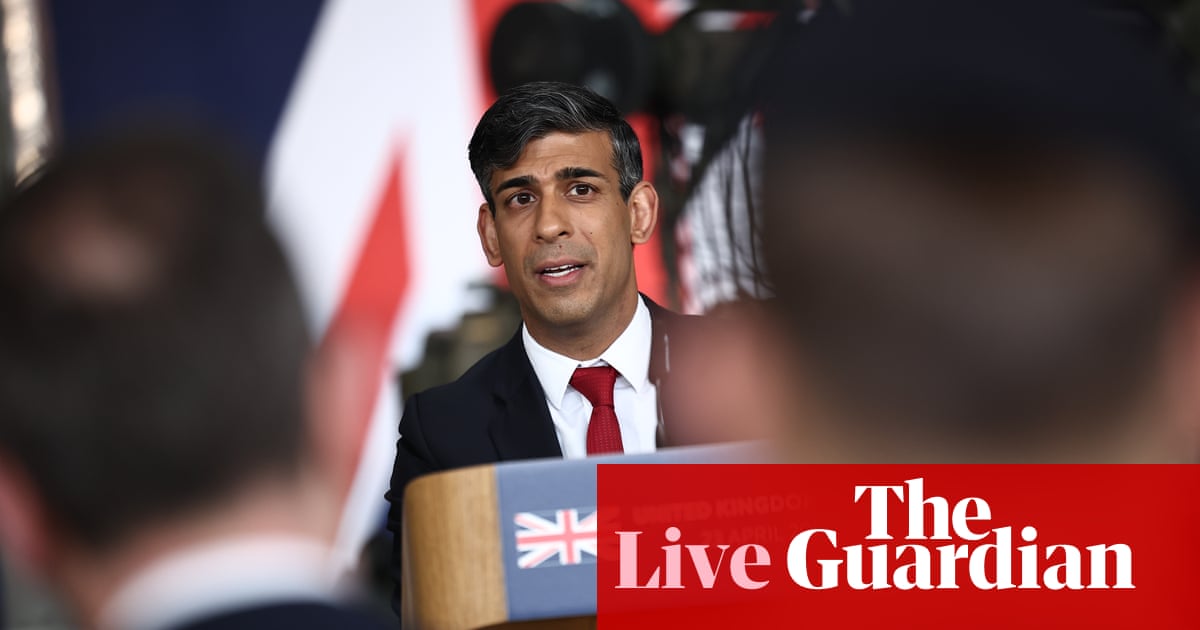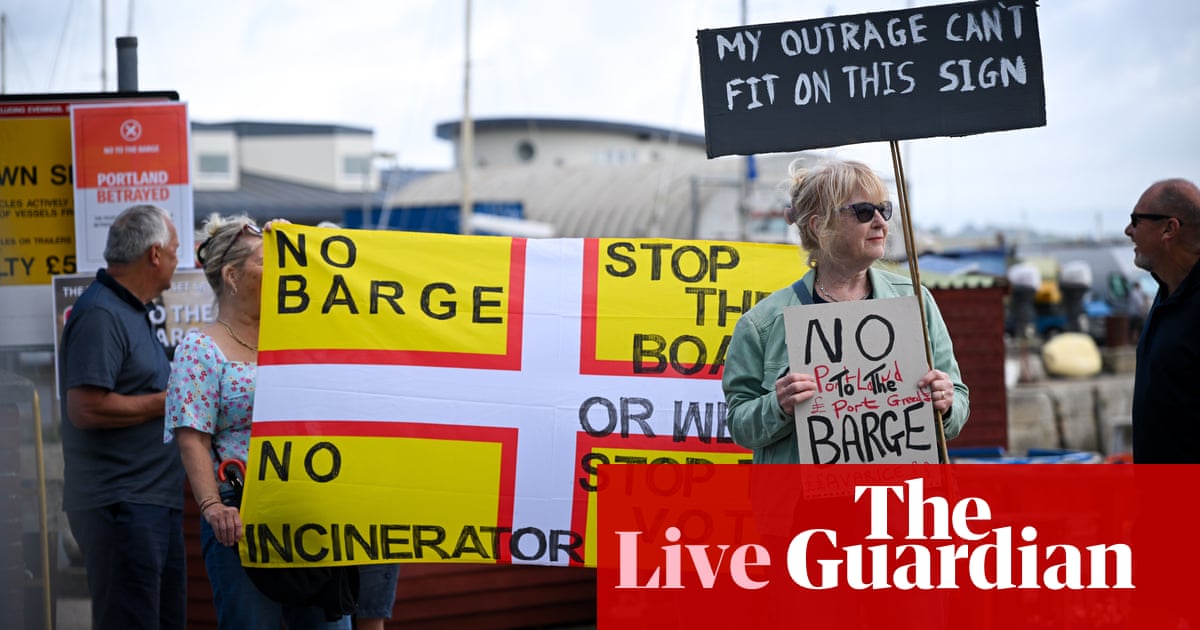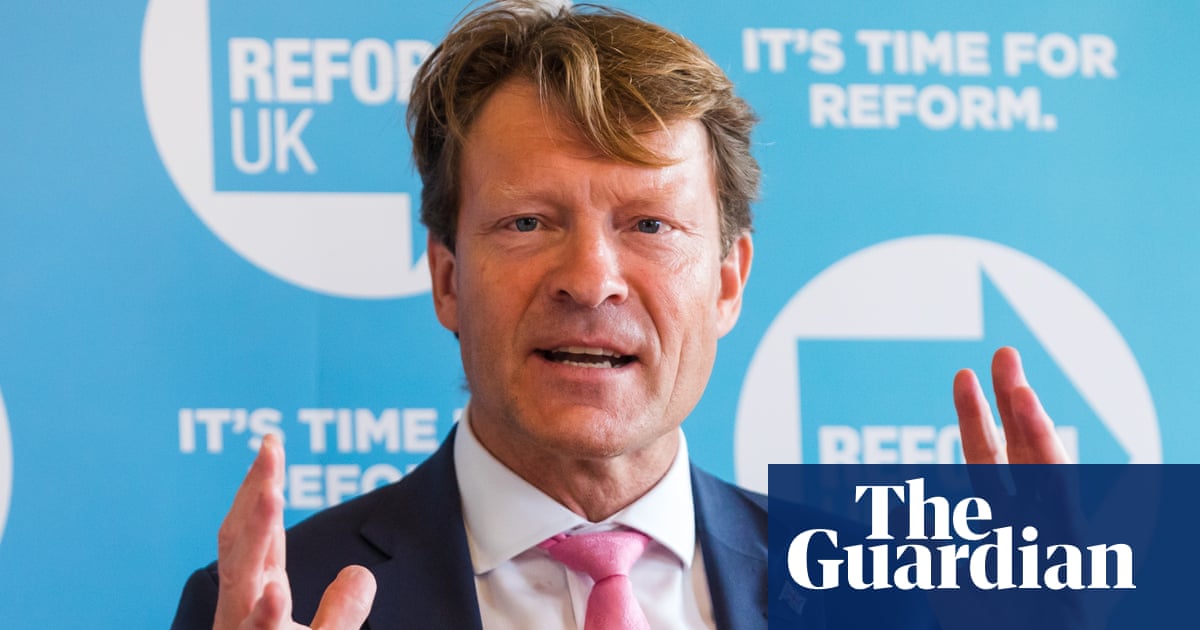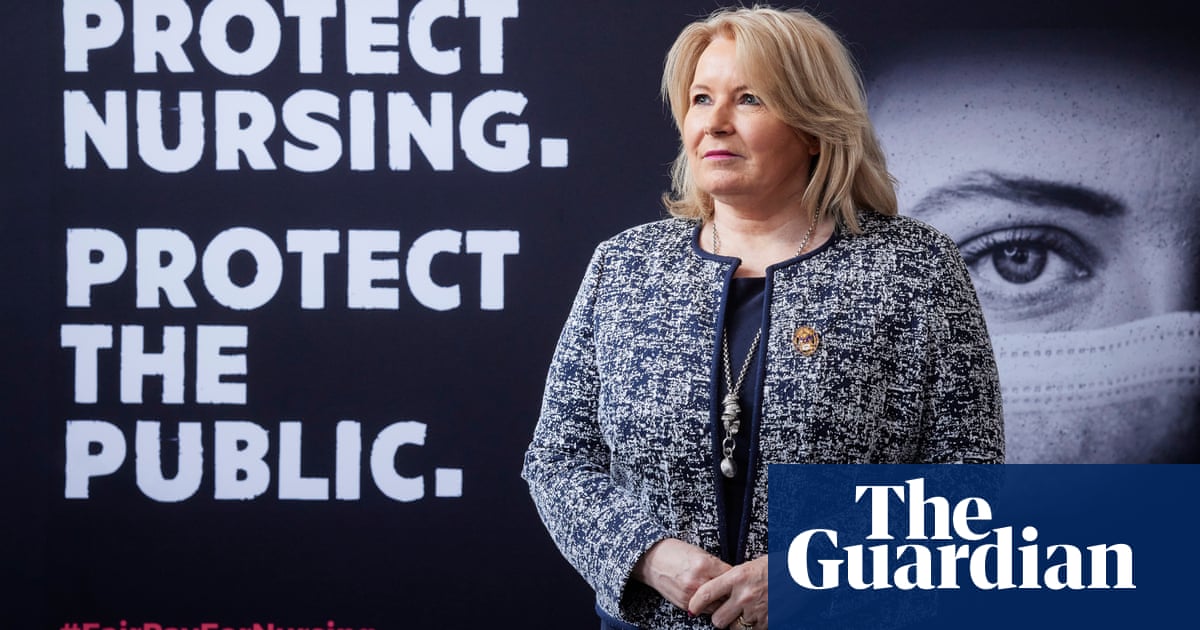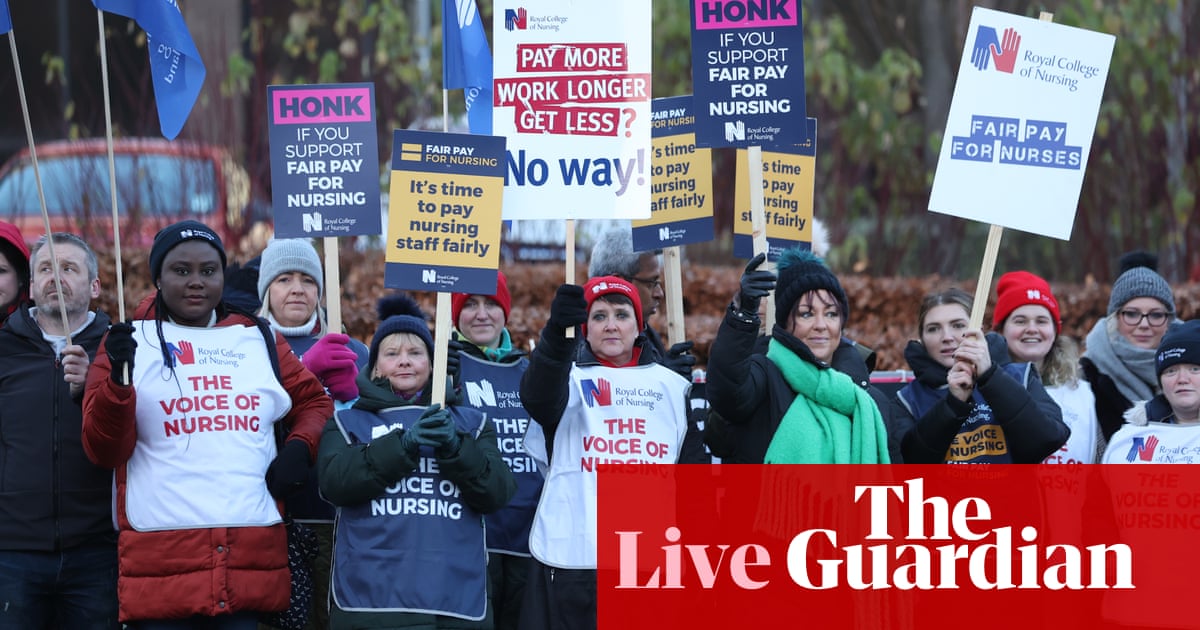
Sunak invites unions to talks from Monday – but offers no hint he"s willing to compromise on current pay offers
In his interview Rishi Sunak said he hoped talks with the unions about pay could start on Monday. Yesterday the government proposed talks with the public sector unions on their pay settlement for 2023-24, and Sunak revealed this morning that the government would like those talks to start within days. He said:
The government has written, all departments have written to all their unions inviting them for talks on Monday so that we can have those conversations talking about what’s affordable, what’s reasonable, what’s responsible for our country.
I think everyone agrees that the most pressing economic priority we have is reducing the cost of living and getting a grip of inflation is the best way we can do that to ease the cost of living, not only for nurses, but for everyone.
But the government does not want to talk about the pay settlement for the current financial year, 2022-23, at these talks, and the unions have said this means they won’t offer a solution to the current disputes, which are about this year’s pay offer, not next year’s.
And when Sunak was asked if he was willing to respond to the olive branch offered by the Royal College of Nursing, and meet them “halfway” on pay, as Pat Cullen has proposed (see 9.19am), he indicated that the government was not minded to budge. Asked if he would extend the pay offer to nurses, or meet them halfway, he replied:
We’ve always been clear that we want to have a grown-up on conversation, a two-way conversation with union leaders. And that’s why all departments have written to all their unions inviting them room for talks on Monday so that we can have those conversations, talking about what’s affordable, what’s reasonable, what’s responsible for our country.
I think everyone agrees that the most pressing economic priority we have is reducing the cost of living, and getting a grip of inflation is the best way we can do that to ease the cost of living, not only for nurses, but for everyone.
Asked if the talks would cover this year’s pay offer, as well as next year’s, Sunak just repeated what he said earlier about wanting a “grown-up conversation”.
Afternoon summary
Rishi Sunak has said that trade unions have been invited to talks with the government on Monday for a “reasonable” conversation about pay. But the talks are not due to cover this year’s pay settlement, which is the cause of the strikes and which ministers do not want to reopen, but instead next year’s pay settlement. In an interview, Sunak gave no indication that he was willing to put this year’s pay settlement on the table. And he also declined to respond to a compromise offer from the Royal College of Nursing, which said it was willing to meet the government “halfway” on pay. (See 11.12am.)
Train operating companies have offered the drivers’ union a two-year pay deal in a bid to resolve the dispute which has led to a series of strikes, PA Media reports. PA says the Rail Delivery Group said it was offering a “landmark outline proposal” that would deliver more reliable services for passengers, in exchange for a pay increase of 4% for 2022 and 4% for this year It also includes a commitment to no compulsory redundancies until at least 31 March 2024.
Unite ambulance workers will strike on 23 January across England and wales, the union has announced, joining Unison members.
Mick Lynch has admitted that public support for rail unions has been dented by weeks of strikes, but said the government was still “losing the argument” in the long-running pay dispute.
More than a quarter of ambulance patients in England waited more than an hour to be admitted to A&E in the last week of 2022, amid “one of the most difficult” winters in NHS history.
The headteacher Katharine Birbalsingh has quit as the UK government’s social mobility head after little more than a year, admitting her outspoken views meant she was “doing more harm than good”.
All firms reportedly expected to get some benefit from business energy support package due next week
All British firms will get a limited discount on electricity and gas bills, while energy-intensive industries will get extra help, under a government support package to be announced next week, the Financial Times reports.
The current energy support package for business will only run until the end of March and it has taken the Treasury longer than expected to finalise the replacement. In their story Jim Pickard and Daniel Thomas report:
The new package will cost about £5bn and the subsidies are due to last for one year, according to people briefed on the plan.
It will therefore be far less expensive for taxpayers than the government’s current subsidies for companies’ energy bills, which are set to cost £18bn when the six-month scheme expires at the end of March …
The package represents a big change of stance from chancellor Jeremy Hunt, who said at the autumn statement in November that most businesses would not receive further support from April because the subsidies were “not sustainable”.
Scottish government ministers to hold fresh talks with unions and councils on Monday in bid to avert strikes
Scottish ministers, councils and union leaders are due to host fresh talks on Monday to avert a wave of strikes in schools and hospitals, after teaching and NHS unions refused to suspend threatened industrial action.
The EIS, the country’s largest teachers’ union, has refused to suspend strikes by tens of thousands of Scottish teachers due to take place on Tuesday and Wednesday next week but has arranged for further talks by the national bargaining committee (SNCT) on Monday.
Ministers have so far refused to improve on offers to both teachers and to Scotland’s nurses and midwives; in December, the health secretary, Humza Yousaf, told the Royal College of Nursing and Royal College of Midwives their offer would now be imposed on them.
Those health unions are now preparing to strike for the first time in their history, with dates expected to be published next week. Fresh talks are being organised with ministers on Monday.
The EIS said their pay claim should have been settled last April. Des Morris, an EIS official and chair of the teachers’ side of the national bargaining committee, said: “Trade unions remain committed to reaching a fair, negotiated pay settlement for Scotland’s teaching professionals.”
Shirley-Anne Somerville, the education secretary, urged teaching unions to suspend their strikes while talks were underway. She said:
We are open to considering options to resolve this dispute, and potential scope for compromise. Strikes in our schools are in no one’s interest – including for pupils, parents and carers who have already had to deal with significant disruption over the past three years.
An improved pay deal has been offered to rail drivers in the hope of getting them to call off their strike, the Telegraph is reporting.
Aslef, which represents rail drivers, is being offered a backdated 4% rise for 2022, and a 4% increase for this year.
But the Telegraph says the proposal, which has been agreed by the Department for Transport, would require train drivers to accept new conditions, including being available to work on Sundays.
Aslef has not yet responded.
Only 4% of people completely or fairly confident government will be able to solve small boats crisis, poll suggests
This week Rishi Sunak staked his credibility on delivering on the five promises that he set out on Wednesday. The most difficult related to small boats, and although the actual promise is just about passing legislation, in the shorthand version this has become “stop the boats”.
This may turn out to be a colossal communications error. Most experts think that stopping small boat crossings in the next year or two will be almost impossible.
According to a PeoplePolling poll for GB News, only 4% of people are completely (1%) or fairly (3%) confident the government will be able to solve the small boats crisis.
Another 11% of people are either somewhat (4%) or slightly (7%) confident the government will be able to solve it.
But 57% of people are “not confident at all” the government will be able to solve it, the poll suggests.
Scottish Tory leader claims Labour "in unofficial coalition" with SNP at Holyrood
Douglas Ross, the Scottish Conservative leader, has accused Labour of being “in unofficial coalition” with the Scottish National party. He made the claim in a speech this morning in which he argued that only the Tories were a “viable alternative” to the SNP at Holyrood. He said:
Just before Christmas, we saw Labour MSPs whipped to vote for Nicola Sturgeon’s gender recognition reform bill …
Nicola Sturgeon faced more opposition in the passing of her bill from SNP backbenchers than she did from Anas Sarwar and his party.
And the exact same was true during the Hate Crime Act in the last parliament. An SNP government act that has undermined freedom of speech in this country. Again, passed on the back of Labour votes.
On North Sea jobs, on prisoner voting, on rent controls, on the future of Scottish education and on Covid laws – Labour backed the nationalist position …
Even more incredibly, Keir Starmer actually looks to Nicola Sturgeon’s government for inspiration! He has said that a UK Labour government would introduce their own Hate Crime Act and gender recognition reform bill …
There is no need for a post-election pact, a Sturgeon-Starmer alliance already exists. In so many areas you couldn’t fit a hair between Labour and the SNP.
They share the same approach on free speech, on women’s rights, on fair justice and so many other issues …
On almost every part of her government’s agenda, Nicola Sturgeon can count on Labour votes in the same way that she can count on the support of the Greens.
They are already in an unofficial coalition – working hand in glove to support the SNP government. The only difference is that Anas Sarwar has not managed to follow Patrick Harvie and Lorna Slater in securing a ministerial salary for his work.
In 2015 the Conservatives argued that Ed Miliband would be reliant on SNP votes if he won the general election, and this mobilisation of anti-SNP (arguably anti-Scottish) opinion helped to contribute to David Cameron’s surprise majority victory.
Keir Starmer is determined to avoid the same thing happening to him, and has repeatedly ruled out doing a deal with the SNP.
Social Mobility Commission chair resigns saying her taste for controversy doing it "more harm than good"
Katharine Birbalsingh, the outspoken headteacher appointed to chair the Social Mobility Commission in 2021, has resigned, saying she concluded she was doing the organisation “more harm than good”.
In an article for Schools Week, Birbalsingh, who first achieved prominence with a speech to the Tory conference in 2010 attacking failures in state education, identified two principal reasons why he continued presence as chair was harming the commission.
First, she accepted she generated too much controversy.
Over this past year, I have become increasingly aware that my propensity to voice opinions that are considered controversial puts the commission in jeopardy.
When I gave my inaugural speech in June last year, I spoke about how we often have too narrow a view of social mobility: we often imagine the feel-good rags-to-riches trope of Hollywood movies when there are so many other mobilities we could and should celebrate …
We had hoped that this new narrative might be received with interest. Instead, the press insisted that I personally believe ‘working class people should stay in their lane’. Other interesting points were then lost amid the outrage. A tiny apology was published days later, but the damage had already been done. I am still to this day attacked for my apparently abhorrent views on social mobility.
She said that as a result of the controversy she was attracting, she was starting to think like a politician – a prospect she found alarming.
At the end of a recent interview, I realised that my idea of a successful discussion was now one where I manage to avoid giving opinions that might bring attention to the commission. Instead of going out there to bat for the team and celebrate our achievements, I am becoming a politician. And I can’t bear the idea of ever being a politician. It just isn’t who I am or a skillset I wish to develop.
But Birbalsingh also said that the fact that she combined chairing the commission with being head of the successful Michaela community school in north London, which is noted for its traditional ethos and strict behaviour policy, meant that people would suspect any research by the commission into education would be slanted to justify her school’s approach.
She went on:
On balance then, I am doing the Social Mobility Commission more harm than good.
Kemi Badenoch, the equalities minister, has announced that Alun Francis, the principal of Oldham College and deputy chair of the commission, will replaced Birbalsingh on an interim basis.
Here is Mick Lynch, the RMT general secretary, explaining why he thinks the government’s proposed anti-strike bill won’t work and might be illegal.
Brexit: thousands of Britons expelled from EU since end of transition period
More than 2,250 British citizens were ordered to leave EU member states between the end of the Brexit transition period and September last year, according to figures from the bloc’s statistical office. My colleague Jon Henley has the story here.
Government report suggests no justification for extending minimum service levels in anti-strike bill beyond transport
Yesterday, when Keir Starmer said Labour would opposed the government’s new anti-strike law, he said that one reason was because it would not even work. He said he thought the government itself had been told it would be “likely to make a bad situation worse”.
Starmer was referring to an impact assessment published by the government last autumn after it unveiled a transport strikes (minimum service levels) bill. That bill received almost zero media attention, because it came out at the time Liz Truss’s government was collapsing, but it was the precursor to what was announced yesterday. The Truss bill would have required unions to provide minimum services during strike days in transport. The new bill, which will replace it, goes much further, and will impose minimum service levels in areas like health and education too.
The impact assessment highlights at least three potential problems with the MSLs in transport. It says they could make staff shortages worse.
In the event that staff do lose their jobs as a result of failing to report for work when rostered to cover for MSLs, an unintended consequence could be that if a material number of workers have their employment terminated then employers may find that they are low on staff to run normal services if the situation becomes extreme.
It says MSLs in transport could lead to an increase in disruption short of a strike.
In addition to the potential increase in strike action prior to MSLs being introduced, a further significant unintended consequence of this policy could be the increase in staff taking action short of striking.
And it says MSLs in transport could lead to more strikes taking place.
A similar risk is an increased frequency of strikes following a minimum service level being agreed. This would reduce the overall impact of the policy as although service levels would likely be higher than the baseline, it could mean that an increased number of strikes could ultimately result in more adverse impacts in the long term.
Alongside the impact assessment, the government also published in October a memorandum explaining how the Truss bill would be compatible with the European convention on human rights. This is also awkward for the government because it says that, although MSLs for transport are compatible with the ECHR (which guarantees the right to freedom of assembly and association), it implies that in health, fire and education they might not be justified.
It says that in health, fire and education, there is already legislation in place designed to “mitigate the impacts of industrial action in those sectors on wider society”.
And, in education, it says MSLs would not work anyway. It says:
The large number of employers in the education sector would also likely make minimum service arrangements difficult and very burdensome to implement.
Richard Arthur, head of trade union law at Thompsons solicitors, said:
The human rights memorandum accompanying [the Truss bill] set out reasons why minimum service levels were not justified in fire services, health settings and education and yet this is what is being proposed …
The introduction of minimum safety levels does not comply with the UK’s legal obligations under convention No 87 of the International Labour Organisation on freedom of association and protection of the right to organise, and article 11 of the European convention on human rights.
The legal challenges when they come (and they will) are not something that the government can sidestep saying ‘Brexit has set us free’. The breaches will be of conventions that the government has signed up to that come from the Council of Europe and the International Labour Organisation not the EU.
The Royal College of Nursing has renewed its claim that Rishi Sunak is “detached from the reality” of the NHS in the light of the latest ambulance waiting times. Commenting on the latest figures, Patricia Marquis, the RCN’s director for England, said:
Our NHS is at the point of collapse but we have a prime minister who is detached from the reality of the situation.
Bed occupancy rates are running at dangerous levels – around 95% – with every square inch of hospital space being used to add more patients, yet there are not more nursing staff to treat the ever growing number of those who need care.
Hospitals are having to expand into corridors while patients sleep in their cars because there are no beds. There is simply no slack in the system and precious few nursing staff.
At the same time there are almost 90,000 patients who are fit to be discharged but there aren’t the community and social care staff to care for them.
We are urging the government to show a renewed sense of urgency in opening negotiations on the current NHS pay award – fair pay is the only way to recruit and retain the nursing staff we need.
According to the latest polling from YouGov, the Labour lead over the Conservatives has gone down marginally since December but is still very large by historic standards (at 21 points).
And Keir Starmer has a much more modest lead over Rishi Sunak on who would make the best PM, the poll suggests.
Steve Barclay, the health secretary, implied that flu, and the ongoing impact of the Covid pandemic, were primarily to blame for the crisis in the NHS when he spoke to reporters this morning. On a visit to Watford, he said:
We recognise because of that massive surge in flu from 43 cases this time last year to over 5,100, coming on top of the pressures of Covid and the wider pressures of a pandemic, that has put massive strain on the NHS, particularly at a time over Christmas when primary care, community services are often lighter than they would be at other times.
When it was put to him that it was disingenuous to blame Covid and flu, when issues with social care had been left unaddressed by successive governments, Barclay replied:
I have prioritised focusing on the integration between health and social care, and so has the prime minister and the chancellor …
At a time when the Treasury is under very significant pressure because of the cost of the pandemic, the cost of the war in Europe, the impact that has on the cost of living, on energy prices, the chancellor has prioritised the NHS and social care.
Quarter of ambulance patients in England faced hour’s wait for A&E
More than one in four ambulance patients in England waited more than an hour to be admitted to A&Es in the last week of 2022, partway through “one of the most difficult” winters in NHS history, my colleagues Pamela Duncan and Rachel Hall report.
Transgender and non-binary people have been counted for the first time in the 220-year history of the census for England and Wales, which has revealed that 262,000 people identify as a gender different to their sex registered at birth. My colleagues Robert Booth and Michael Goodier have the story here.
Former cabinet minister Robert Buckland urges government to improve pay offer to nurses
Sir Robert Buckland, the former justice secretary and former Welsh secretary, has urged the government to compromise with the nurses on pay. In an interview with Times Radio, he said that he thought Pat Cullen’s offer to meet the government halfway on pay (see 9.19am) was “significant” and he suggested the government should make some sort of one-off, top-up offer to the nurses. He said:
There should be a middle way. I think that some sort of bespoke arrangement does seem to me to make sense. Otherwise, you’re upending the whole structure to deal with a problem now.
Asked if he agreed with Sir Jake Berry, the former Tory chair, who said in December that nurses were a special case and should be paid a lot more, Buckland said Berry’s point had merit. He went on:
I think this isn’t an emotional appeal. This is a hard headed realistic approach that acknowledges the fact that nurses are key if we are to deal with the pressures that the winter and the Covid backlogs have brought the NHS and losing days to strike action is really costing us a huge amount in terms of more problems for our health service.
Buckland and Berry were both cabinet ministers when Liz Truss was PM, but were sacked or left when Rishi Sunak replaced her.
Pupils were learning about the word “diacope” when Rishi Sunak joined them during a lesson at the Harris Academy in Battersea, south London, this morning. It is a term that refers to repeating a word or phrase for rhetorical effect.
It is not clear whether or not the teacher was trying to make a point, but Sunak (like many frontline politicians) is an expert at repetition. In his pooled interview this morning, he repeated not just words and phrases, but more or less whole answers. (See 11.12pm.)




